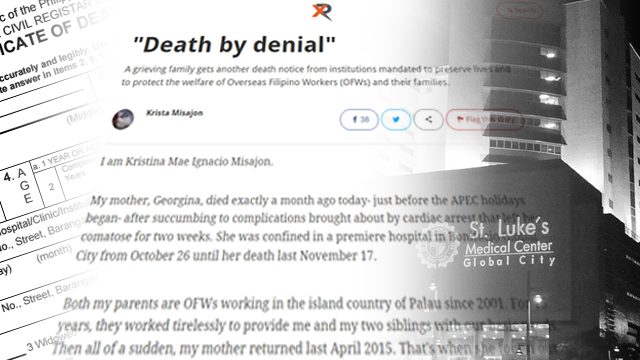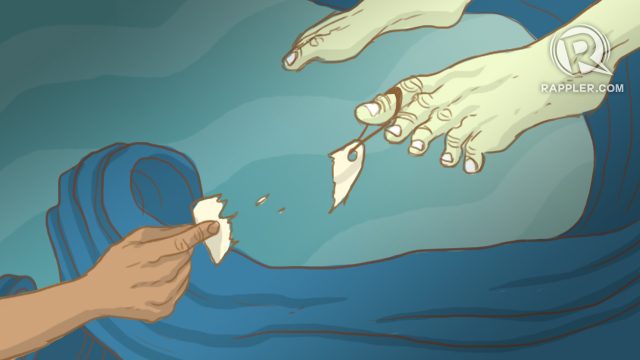SUMMARY
This is AI generated summarization, which may have errors. For context, always refer to the full article.

MANILA, Philippines – For Kristina Misajon, 26, she could not imagine anything worse than losing her mother to cancer. That was until her family spent a harrowing week trying to give her mother a proper burial.
Kristina’s mother, Georgina Misajon, 56, was diagnosed with Stage 4 squamous cell carcinoma (tongue cancer) in April 2015. Months later, she succumbed to the disease on November 17 at St. Luke’s Medical Center in Taguig, where she received cancer treatment.
But that was not the end of the family’s ordeal.
The hospital released the body but withheld the death certificate due to the family’s unpaid hospital bills.
Kristina recounted the experience in her article on X and described her family’s attempt to secure the document needed to cremate the body.
“The funeral service provider requested for a photocopy of the death certificate so they can proceed with the cremation proper. On the first day of her wake, my father and younger sister went to the hospital, but the hospital flatly refused to provide us a photocopy,” Kristina wrote.
The family could not afford to settle P1.3 million in hospital bills, incurred after numerous sessions of radiation therapy and chemotherapy.
Although the Philippine Charity Sweepstakes Office (PCSO) provided P500,000 to help pay for some expenses, the hospital required the family to issue a promissory note offering collateral.
“We already knew that their promissory note will feature some impossible demands. Yes, we were required to declare collaterals in their promissory note like real estate properties, etc.,” wrote Kristina.
Kristina told Rappler in a phone interview that the negotiations with the collections officer of the hospital was “humiliating” because she was asked about her parents’ finances and questioned why they weren’t able to save money even if both her parents were overseas Filipino workers (OFWs).
She recounted the conversation they had with the Collection Manager:
“Gaano katagal na po kayong OFW?”
“15 years,” my father replied.
“Si Mommy ho?” (a clear reference to my mother)
“15 years din po. Since 2001.”
He also asked impertinent questions like where we siblings studied for college.
He eventually asked whether we had properties.
“Wala po,” I replied.
“Alam niyo po kasi, sasailalim pa po kayo sa investigation. Titingnan namin kung talaga bang wala kayong credit cards. Yung bank statements niyo, titingnan namin.”
I looked at him and told him, “Sige po, tingnan ninyo. Wala po talaga kaming ipon o maipapambayad sa inyo ngayon. Pagpapacremate nga ho ng Mommy ko problema namin sa ngayon. Kaya nga po humihingi kami ng photocopy.”
Kristina adds that although the manager tried to find a way to approve the family’s request to release the death certificate, his superiors later denied the request.
Instead, the Misajon family was able to get a handwritten letter from the doctor saying her mother expired. Government offices, however, refused to accept the document as valid, so the family still cannot receive the death benefits they need to pay their bills.
Although the family was eventually able to have Georgina cremated, the funeral home is witholding the certificate of cremation.

Rights of the dead?
For the Misajon family, they chose a private hospital to provide the best care they could afford for Georgina. What they didn’t anticipate was that this decision would lead to other problems down the line.
But this is not the first time payment policies in private hospitals have come under criticism.
In October 2015, Nobel laureate Richard Heck died in a private room of a government hospital. He was initially taken to a private hospital due to severe vomiting, but was refused admission due to unpaid insurance bills.
In November 2015, Alfred Rosario sued St. Luke’s Medical Center in Quezon City. The hospital reportedly refused to release his son’s body because of unpaid medical bills.
Republic Act 9439 prohibits the detention of patients with outstanding bills. However, in the case of the deceased, the law does not cover those in private rooms.
“Why must there be a legal blur between patients admitted in private hospitals vis-à-vis patients in public hospitals? Why are we being denied necessary legal documents that will help us claim benefits afforded to my mother by the law?” Kristina wrote on X.
Waiting
Since the incident, the family has sent a demand letter to the hospital. The family also wrote a complaint to the Private Hospitals Association of the Philippines (PHAP) – the organization governing private hospitals around the country.
PHPA Executive Director Edlane Ulama confirmed they received the complaint. Ulama said the case is under discussion by their Legal Committee but said private hospitals have their own internal policies in handling and issuing death certificates.
Rappler attempted to get a statement from St. Luke’s Medical Center Global City but they have not yet commented on the issue.
For now, Kristina has approached concerned agencies and Senators TG Guingona, Nancy Binay, and Koko Pimentel to appeal to them on the basis that their experience is a violation of their human rights.
By writing about her family’s ordeal, Kristina hopes her family’s case would give way to the amendment of RA 9439 so no one “goes through (that hell) ever again.” – with a report by Bea Orante/Rappler.com
Noel Lopez is a Rappler intern, and an AB Mass Communication student at AMA University, Quezon City.
X is Rappler’s platform for sharing your stories. Try it out today!
Add a comment
How does this make you feel?
There are no comments yet. Add your comment to start the conversation.